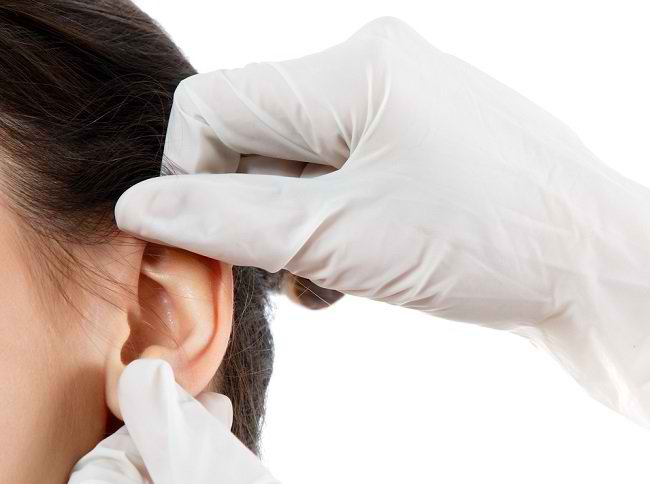Alpha-1 antitrypsin deficiency is a hereditary disease caused by a lack or absence of the alpha-1 antitrypsin protein. This will cause interference with the lungs and liver. Generally, people with this disease begin to feel the appearance of symptoms at the age of 20-50 years.
Alpha-1 antitrypsin deficiency occurs due to genetic changes or mutations that are passed from parents to children. This genetic mutation will interfere with the work of the liver in producing alpha-1 antitrypsin protein.

The alpha-1 antitrypsin protein plays an important role in protecting the lungs and liver. When the body lacks this protein, the lungs and liver are more susceptible to damage.
Causes of Alpha-1 Antitrypsin Deficiency
Deficiency of alpha-1 antitrypsin occurs due to changes or mutations in the gene on chromosome 14 which functions to regulate the production of alpha-1 antitrypsin protein in the liver. Mutations in this gene will cause the formation of abnormal proteins that cannot work properly, so that the body experiences alpha-1 antitrypsin deficiency.
Alpha-1 antitrypsin deficiency is a condition that is passed from parents to children. Generally, symptoms will appear if both parents pass the abnormal gene in the child. If only one parent inherits the abnormal gene, the child becomes a carrier of the abnormal gene (carrier).
Symptoms of Alpha-1 Antitrypsin Deficiency
Alpha-1 antitrypsin is a protein that plays an important role in protecting the body by controlling the neutrophil elastase enzyme so that it does not attack healthy cells. When there is a deficiency of alpha-1 antitrypsin, the neutrophil elastase enzyme will attack healthy cells. As a result, complaints and symptoms will appear. The lungs are the organs most commonly affected by this condition.
In addition to affecting the amount of protein that can work properly, alpha-1 antitrypsin deficiency can also cause abnormal protein buildup in the liver, which then causes liver problems.
The appearance of symptoms due to this condition usually depends on how severe the alpha-1 antitrypsin protein deficiency is. Symptoms can appear in any age group, from infants, children, adolescents, to adults. However, symptoms are more often seen when a person is 20–50 years old.
Some of the symptoms that can appear in adulthood are:
- Shortness of breath after light activity
- Not being able to do physical activities, such as exercising
- Wheezing or breathing with a “whoosh” sound
- Chest feels tight
Other symptoms that may appear include:
- Weight loss
- Frequent respiratory infections
- Tired easily
- Heart pounding while standing
- Yellow skin or eyes (jaundice)
- Swelling in the abdomen or legs
- Coughing or vomiting blood
These complaints and symptoms will get worse if people with alpha-1 antitrypsin deficiency smoke, are exposed to cigarette smoke, or consume alcohol.
In certain cases, alpha-1 antitrypsin deficiency can also be characterized by the appearance of panniculitis. Panniculitis is a skin disorder characterized by thickening of the skin. This condition can be accompanied by the appearance of lumps or patches on the skin that feel painful.
If an alpha-1 antitrypsin deficiency occurs in a baby, some of the symptoms that can appear are yellow skin and eyes in the baby, difficult weight gain, an enlarged stomach due to an enlarged liver, nosebleeds, or bleeding.
When to go to the doctor
Immediately consult a doctor if you or your baby experience the complaints and symptoms as mentioned above. Early examination is needed to find out the exact cause of the complaints you or your baby are experiencing.
Alpha-1 antitrypsin deficiency can also affect lung function and work. Check with your doctor if you have frequent coughing, shortness of breath, or difficulty breathing.
Because alpha-1 antitrypsin deficiency is hereditary, if you have alpha-1 antitrypsin deficiency and are planning to become pregnant, check with your doctor to determine the risk of passing this disease on to your child.
Alpha-1 Antitrypsin Deficiency Diagnosis
The doctor will ask questions about the complaints and symptoms that you or your child is experiencing. Next, the doctor will perform an examination to see if there are additional breath sounds, such as the sound of “squeal”, increased respiratory rate, discoloration of the skin and eyes, and enlargement of the liver.
To confirm the diagnosis, the doctor will perform follow-up examinations which include:
- Blood test, to measure the level of alpha-1 antitrypsin protein in the blood
- Chest X-ray, to detect lung damage
- CT scan, to see the condition of the lungs and liver more clearly
- Spirometry test, to evaluate lung function
- Genetic testing, to detect abnormal genes that can cause alpha-1 antitrypsin . deficiency
- Skin biopsy, to determine the cause of panniculitis that may occur due to alpha-1 antitrypsin deficiency
Alpha-1 Antitrypsin Deficiency Treatment
Treatment of alpha-1 antitrypsin deficiency aims to relieve symptoms, prevent disease progression, and prevent complications. Treatment will be adjusted to the levels of alpha-1 antitrypsin protein in the body, liver function, and lung function.
If the liver and lungs are still functioning normally, the doctor will advise the patient to have regular check-ups and avoid smoking, exposure to pollution, and alcohol consumption.
If alpha-1 antitrypsin deficiency has caused liver or lung disorders, these conditions need to be treated according to the patient's condition and severity. Some of the treatment steps that can be taken are:
- Giving bronchodilator drugs, to help smooth the airways in the lungs so that they can breathe more easily
- Administration of corticosteroid drugs, to relieve inflammation in the lungs
- Augmentation therapy, to increase levels of alpha-1 antitrypsin protein so that the lungs continue to function normally and prevent further damage
- Liver transplant, to replace a liver that has been damaged
If alpha-1 antitrypsin deficiency also causes panniculitis, the doctor will give antibiotics, such as tetracycline, dapsone, or other drugs, such as colchicine.
Complications of Alpha-1 Antitrypsin Deficiency
If left untreated, alpha-1 antitrypsin deficiency can increase the risk of the following diseases:
- Lung disease, such as chronic obstructive pulmonary disease (COPD), pulmonary fibrosis, or lung cancer
- Liver disease, such as hepatitis, liver cancer, cirrhosis, or liver failure
- Vasculitis or inflammation of the blood vessels
- Pancreatic disorders, such as pancreatitis
Prevention of Alpha-1 Antitrypsin Deficiency
Because it is caused by a gene mutation, alpha-1 antitrypsin deficiency is difficult to prevent. However, to prevent further damage to the liver and lungs due to this condition, there are several steps that can be taken, namely:
- Exercise regularly
- Eat a nutritionally balanced diet
- Maintain optimal body weight
- Do not smoke and avoid cigarette smoke
- Not consuming alcohol
- Avoid exposure to air pollution, including dust or motor vehicle fumes
- Influenza vaccination and pneumococcal vaccination
- Get vaccinated for hepatitis









